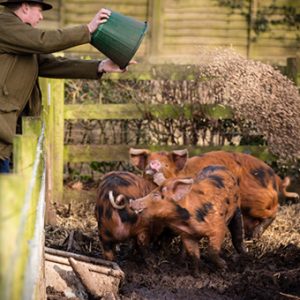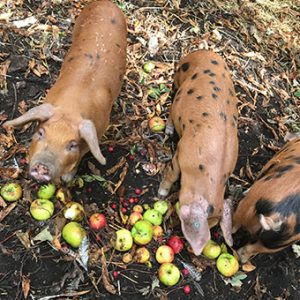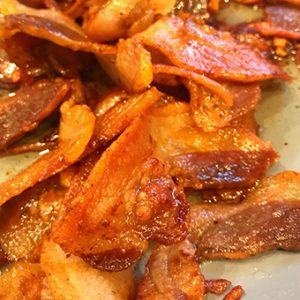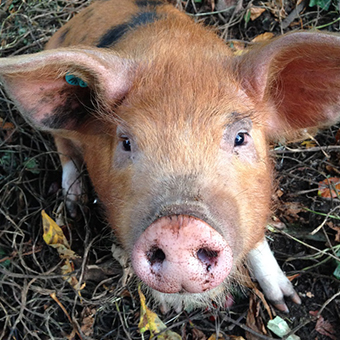Our Vale House Kitchen Pigs
As many of our visitors will know already, at Vale House Kitchen we don’t just keep our country skills in the classroom – we like to practise what we preach, and one of the ways we do that is by raising our own pigs, to supply our kitchen table with high-welfare meat that we know is really good quality. Some folks might not like the idea of getting so close to the animals that will be part of dinner in the months to come, but we think if you’re going to eat meat, the most responsible and respectful way to do so is to get involved with the process yourself, as much as you can, and make sure that animal welfare is a high priority.

We currently have three lovely ladies in our orchard: Pinky, Porky and Perky. They’re all Oxford Sandy & Blacks (OSBs), a traditional breed of pig that is rather rare these days, but which has been built back up from virtual extinction not so long ago. We get ours from Susan Tanner who runs Plum Pudding Pigs just a short 15 minute drive from Vale House. Oxford Sandy & Blacks are a really friendly, good-natured breed of pig – our pigs are always happy to see us and love a good scratch round the ears when we come to visit. If you are interested in learning more about OSBs please check out the Oxford Sandy Black Society homepage. Pigs are naturally social animals, which is why we always have at least two, and they’re also much more intelligent and inquisitive than most people realise. Rather unfairly, pigs tend to get a bit of a bad press – people often think of them as smelly, for example, but in fact they’re very clean and healthy by nature (although they do love a good mud bath – but then, that’s really just the piggy equivalent of a fancy spa treatment!)

Our pigs aren’t pets, of course, but we do really enjoy raising them ourselves, and we’ve been keeping our own pigs for five years now. Famously, they’re very economical to keep, as they love to scoff all our old veg from the veg patch and particularly love apples, so we often treat them to an armful of windfalls from friends’ orchards, which might otherwise just rot away uneaten. Then, of course, there’s the fact that pork is such a versatile meat – it’s often said that you can eat everything except the oink, which is pretty much true! So there’s very little waste with the end product too – which is probably why humans have been keeping pigs and putting pork on the menu for hundreds of years.

If you fancy getting to grips with some traditional skills, we have a number of courses focused on pork, such as Pig Butchery (which also includes an introduction to pig-keeping, and a chance to meet our pigs) and Smoking & Curing, where you’ll have the chance to make your own bacon – believe us, it tastes so much better than the supermarket stuff you’ll never be able to go back.
At the heart of the issue is the fact that when it comes to mass-produced meat, pork can be one of the worst offenders in terms of animal welfare – factory farming of pigs creates some truly awful conditions and one of the best ways to combat this is to vote with your wallet and try not to support it. Of course, we know that not everyone has the wherewithal to keep their own pigs – but you can still help support a better industry by shopping with your local butcher, who’s often more likely to buy from smaller local farms, rather than buying your pork in the supermarket. Don’t be afraid to chat to your butcher about where their meat comes from. If you live in the Bath area like us, we highly recommend both Tunley Farm Butchers and Bartlett & Sons. And why not kick-start good habits with a visit to Vale House to learn a bit more about the whole process of putting pork on the table? Click here to find out more about our next Pig Butchery and Smoking and Curing courses.
